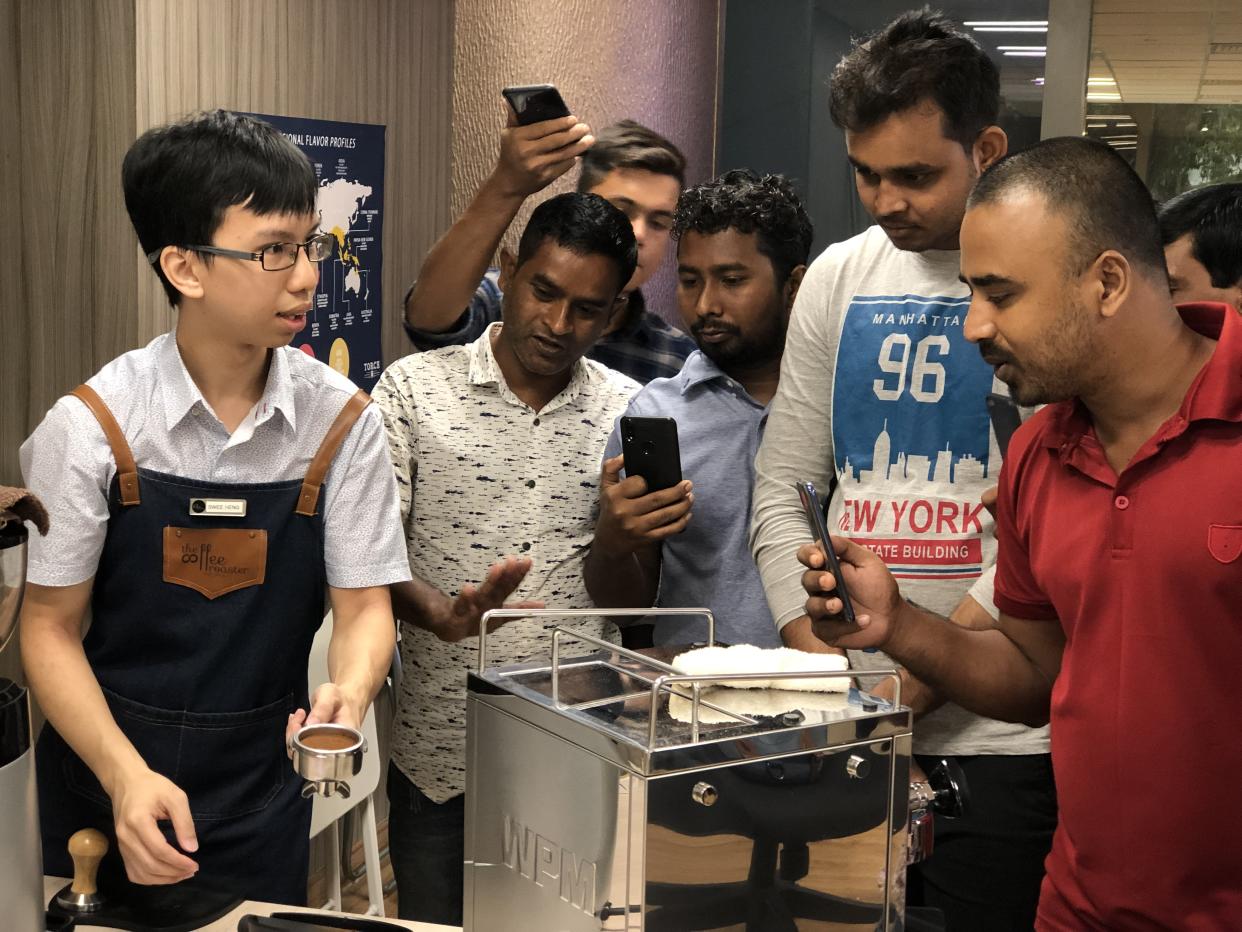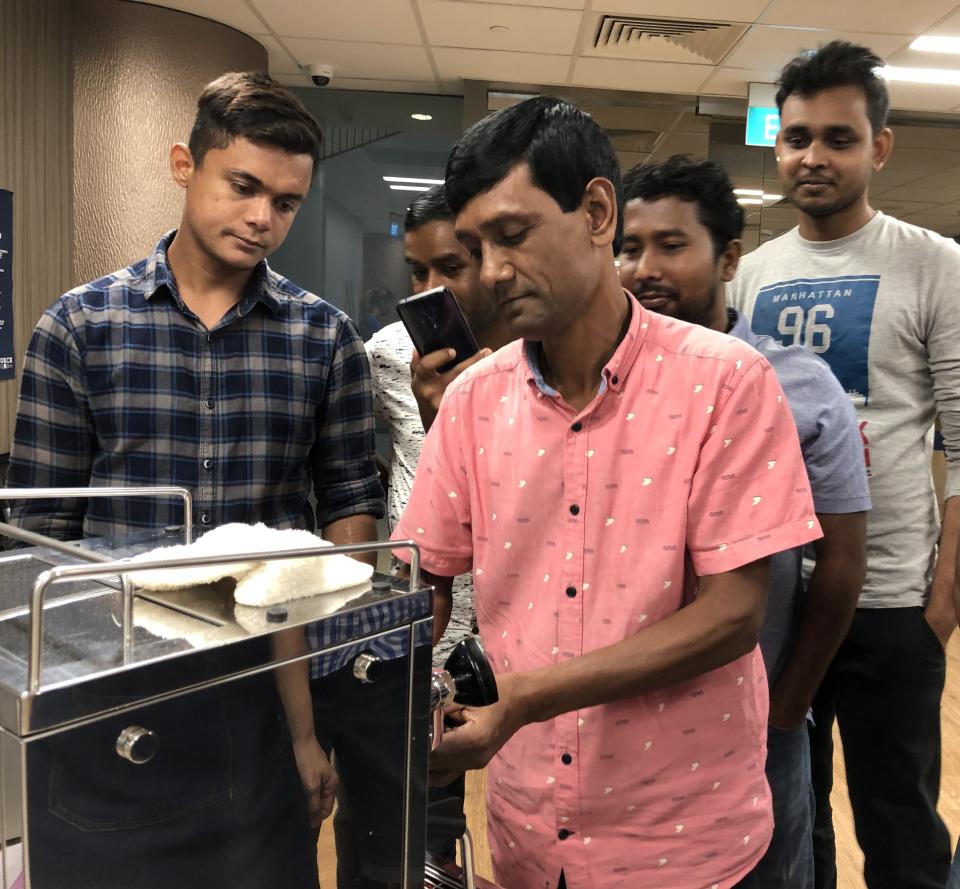Cool beans: Migrant workers in Singapore learn to be baristas

SINGAPORE — On a Saturday morning (14 September) at The Coffee Roaster cafe, founder and owner Ang Swee Heng, 26, was peppered with questions by the audience at his introductory barista workshop.
The queries came from eight blue collar migrant workers from Bangladesh, all in their 20s and 30s. Eager to learn, they asked about everything from the quality of coffee beans to the kind of milk needed to make a good brew, as well as advice on starting their own cafe.
“In my country, you can just take the milk from the cow. Two litres, $1 can buy,” quipped Nobinur, 31, to laughter from his compatriots.
The workshop was the result of a collaboration between foreign worker advocacy group Transient Workers Count Too (TWC2) and The Coffee Roaster, a cafe located on the National University of Singapore grounds.
Ang told Yahoo News Singapore that he often conducts such workshops, mainly for corporate clients like the Cancer Society, either free of charge or at a steep fee discount. The goal is to bring this “everyday beverage” to communities that might not otherwise be able to experience it, said Ang.
“These workers are very sincere. They have a willingness to learn and to ask questions.”
For some of the workers, it was the first time they had tasted gourmet coffee.
All eight are currently unable to work, due to workplace injuries or ongoing salary disputes with their employers. Such cases typically take between six and 12 months to settle.
TWC2 volunteer coordinator Marcel Bandur, 29, came up with the idea of equipping such workers with barista skills due to the “booming cafe culture” in the Bangladeshi capital Dhaka.
“There is a demand for good quality coffee and a shortage of trained baristas,” said Bandur, who has been to Dhaka twice and has many friends in the country.
The Slovak, who has been in Singapore for seven years, added, “I was thinking that if they are trained to a high standard, they will have a competitive advantage when they go back home. Swee Heng will give them a certificate to show that they are trained in Singapore, which has a very good reputation in Bangladesh.”
The researcher with the Asia Research Institute intends to monitor the workers’ progress once they get back home, in order to see how effective the training is. “They cannot work now, so they are not using their time in a productive way. They are really smart people, they just need the opportunities.”
Ironically, Bandur, who once worked as a barista at Starbucks, does not partake of the beverage. “I am allergic to coffee.”

Construction worker Islam Nazrul, 39, is currently embroiled in a pay dispute with his employer, whom he said did not pay him for for three months. He claimed to be owed more than $3,000.
“Before today, I didn’t know anything about coffee. It was a very hands-on experience,” said the father of three, who spoke mainly through his compatriots. And while he has only been in the Republic since February, he is already looking to the future. “I still want to work in Singapore, so I can earn money to start a business back home.”
Other organisations in Singapore, such as the Foreign Domestic Worker Association for Social Support and Training, provide training for FDWs in areas ranging from basic conversational English to basic financial literacy and entrepreneurship. According to the association’s website, these skills are aimed at first-time arrivals, to enable them to work and live well and complete their contract.
But Nobinur, who has been in the Republic for 10 years, is looking to life beyond Singapore. The construction worker fractured both wrists in a workplace accident in March and cannot hold heavy things.
He is currently waiting to carry out additional surgery on his wrists, as well as to seek his workman’s compensation. With the help of family and friends in Dhaka, Nobinur has already procured a store in Dhaka where he plans to sell groceries and also start a cafe.
“If I learn here, I can use the knowledge at home. I have also been watching YouTube videos on making coffee,” said the father of one.
Related stories
Singapore photography festival captures closer ties between locals and migrant workers
Foreign domestic workers contributed $11.1B to Singapore's economy in 2018: study
Plight of abused foreign domestic workers who seek justice and shelter in Singapore



